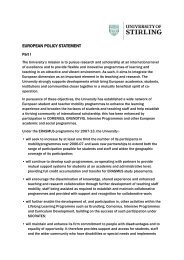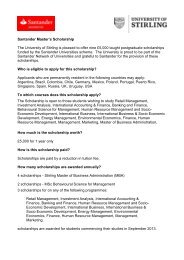Supporting a uK SucceSS Story: The impacT of - Research Councils ...
Supporting a uK SucceSS Story: The impacT of - Research Councils ...
Supporting a uK SucceSS Story: The impacT of - Research Councils ...
Create successful ePaper yourself
Turn your PDF publications into a flip-book with our unique Google optimized e-Paper software.
mind anticipates the end <strong>of</strong> a bout <strong>of</strong> exercise in order to set an initial<br />
pace. Sensory receptors, which monitor the body’s responses, feed<br />
this information back to the brain, allowing it to control the body’s<br />
resources to last until the end <strong>of</strong> the exercise to avoid damage. By<br />
making the brain think in this way it allows the body to tap into this<br />
reserve energy supply and keep on performing.<br />
Mental wellbeing<br />
Among the risks that elite sports participation brings is a<br />
susceptibility to eating disorders, which occur more <strong>of</strong>ten in elite<br />
athletes than the general population. In sports like gymnastics,<br />
with its emphasis on slimness and low bodyweight, vulnerability<br />
to these conditions is greater. <strong>Research</strong>ers at Swansea University<br />
have worked in partnership with British Gymnastics to look at<br />
the welfare <strong>of</strong> elite gymnasts in relation to the presence <strong>of</strong> eating<br />
disorders in certain disciplines <strong>of</strong> the sport. <strong>The</strong> researchers<br />
specifically investigated gymnasts’ perceptions <strong>of</strong> their freedom<br />
to choose and balance the competing aspects <strong>of</strong> their lifestyle.<br />
<strong>The</strong> study combined social science methods with theory from the<br />
fields <strong>of</strong> psychiatry and philosophy to study eating disorders in<br />
elite gymnastics and make recommendations regarding policies<br />
to improve the welfare <strong>of</strong> elite gymnasts, who are pushing the<br />
boundaries <strong>of</strong> their athletic potential. <strong>The</strong> findings from the<br />
research will be made available to a range <strong>of</strong> audiences, to<br />
maximise the impact <strong>of</strong> the study on practices within elite sport.<br />
Ultimately, the research is intended to help the understanding<br />
and development <strong>of</strong> policies to promote the mental health <strong>of</strong> elite<br />
athletes, particularly with respect to eating disorders.<br />
<strong>The</strong> mental wellbeing <strong>of</strong> athletes is as important, if not more so,<br />
when they retire from competition. <strong>The</strong> intensity <strong>of</strong> training and<br />
commitment athletes make to achieve success can have negative<br />
consequences. Pr<strong>of</strong>essor David Lavallee, Head <strong>of</strong> the School <strong>of</strong><br />
Sport at the University <strong>of</strong> Stirling, Scotland’s University for Sporting<br />
Excellence, studied the impact on Olympic and Paralympic athletes<br />
who make the move to other careers after they retire from sport.<br />
<strong>The</strong> research aimed to help young athletes plan for their future<br />
lives after sport and found that high-level sporting competition<br />
plays an important role in developing transferable skills such as<br />
communication and time management, but athletes who focus<br />
exclusively on their sport can become role restricted and be more<br />
at risk <strong>of</strong> finding it difficult to change career. <strong>The</strong> athletes who<br />
were better prepared for life after sport managed to balance<br />
their education and career development alongside training and<br />
competition. <strong>The</strong> research has been adopted by athlete lifestyle<br />
programmes around the world.<br />
“<strong>The</strong> mental<br />
wellbeing <strong>of</strong><br />
athletes is as<br />
important, if not<br />
more so, when<br />
they retire from<br />
competition. <strong>The</strong><br />
intensity <strong>of</strong> training<br />
and commitment<br />
athletes make to<br />
achieve success<br />
can have negative<br />
consequences.”<br />
SECTION two : Health and Wellbeing 31
















